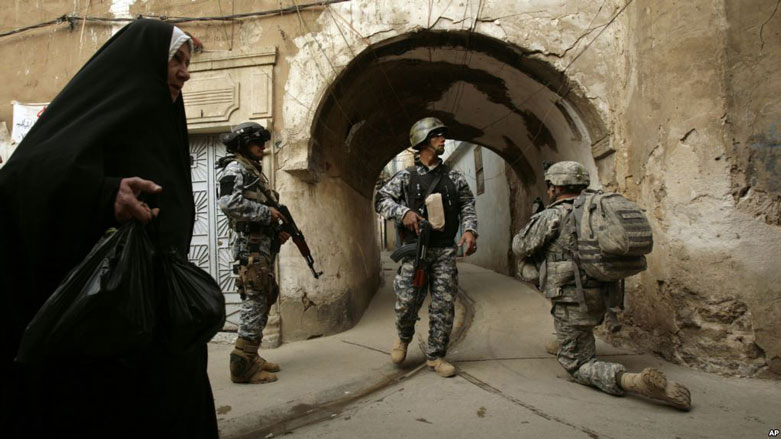Increased risk of friendly fire in Mosul reveals new US role in Iraq

MOSUL, Iraq (Kurdistan24) — Despite Iraqi Prime Minister Haider al-Abadi declaring the fall of the Islamic State’s (IS) ‘Caliphate’ in Mosul, US troops are adapting their role to face the increased risk of friendly fire in the city’s remaining pockets of resistance.
According to AP, US Army Col. Pat Work has been holding a series of urgent in-person meetings with Iraqi Army generals, the federal police, and Iraqi special forces ahead of the final push to drive out IS militants from Mosul’s Old City.
As Iraqi forces progress, the fight is constrained to even tighter quarters than previous battles in the Old City’s neighborhoods, intensifying vulnerabilities of the multiple branches of the security forces targeting the jihadists.
Taking a more prominent role in the fight, US commanders now travel in and around Mosul to share intelligence and advise on plans of attack, revealing a more hands-on role in liberating Iraq's second largest city.
“We’re helping (Iraqi forces) see across the boundaries between their different units... just helping them understand where they are and how rapidly things might be changing,” said Work.
The Col. explained that the new battle space and communication shortcomings mean Iraqi ground troops are at increased risk of being hit by non-precision fire like mortars and artillery launched by their partner Iraqi forces.
“It’s a very violent close fight,” said Work, the commander of the 82nd Airborne’s 2nd Brigade Combat Team who deployed to Iraq in January. “When the bullets aren’t enough, the (Iraqi) commanders want to turn to high explosives which might be mortars or artillery, so understanding where the other guy is all the time is kinda rule number one, so the lethal effect is directed at the target and not accidentally at another player that’s on your team.”
The move is the first of its kind for US troops in the fight against IS in Iraq. The US-led Coalition previously focused mainly on providing logistical support and backing Iraqi forces with airstrikes during the Mosul operations.
The Mosul fight is also the first time all three Iraqi forces have had to cooperate in an urban setting.
Openly partnering with Iraqi forces on the ground within just a few kilometers of the frontline, US commanders under the Trump administration have moved closer to the fight, suggesting Coalition officials believed Iraqi forces needed more tactical support to conduct the operations.
“For any commander, there is no substitute for seeing it with your own eyes... for talking to the stakeholders who are in it making the decisions every day,” he said. “ISIS has no boundaries, so our adviser network can’t have any boundaries. And so part of it is getting out there daily to see it.”
More than ninety percent of Mosul has been retaken from IS. However, Work does not expect US troops to leave Mosul immediately after the last areas are liberated.
“Mosul is going to be a challenge, ISIS is going to continue to challenge the hold,” he said. “We will continue to help Iraqi commanders.”
